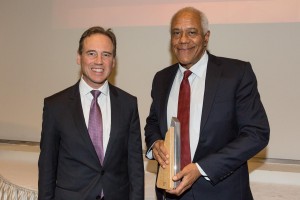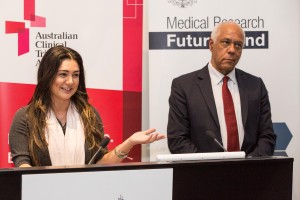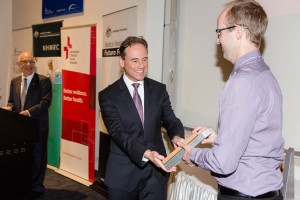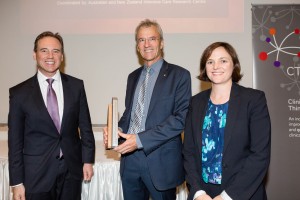
Clinical Trial 2018: National Tribute and Award Ceremony
The Australian Clinical Trials Alliance and the National Health and Medical Research Centre (NHMRC), together with our event partners CT:IQ, MTPConnect, Bellberry and Medicines Australia, hosted the 2018 National Tribute & Awards Ceremony on May 16th 2018 to mark International Clinical Trials Day and celebrate the announcement of the ACTA Trial of the Year and ACTA STInG Excellence in Trial Statistics Award.
We were joined by a number of esteemed guests who took part in the ceremony including the Hon. Greg Hunt MP who presented the awards, along with Mr Frank McGuire, Victorian Parliamentary Secretary for Medical Research, Prof Ian Frazer AC, Chair of the Australian Medical Research Advisory Board, Professor John Zalcberg OAM, Chair of the Australian Clinical Trials Alliance, Professor Anne Kelso AO, CEO of the NHMRC, Dr Sandhya Tewari, General Manager International and Government of MTPConnect, and Professor Ingrid Winship, Executive Director of Research, Melbourne Health.
The event held at the Royal Melbourne Hospital in Melbourne was attended by 170 invited attendees, including heads of ACTA member groups, senior clinical researchers, clinicians, research coordinators, consumer representatives, academic heads, health services executives and senior policymakers. It was widely regarded as a huge success in terms of raising profile for the tremendous value of investigator-driven trials conducted in Australia, and brought together public health, industry and consumer representatives to honour all the people who advance healthcare by making ground-breaking clinical trials possible.
The ACTA Trial of the Year Award was established in 2016 to honour and celebrate the outstanding achievements of ACTA members who advance clinical practice and save or improve the lives of patients every year through collaborative, multicentre, investigator-driven clinical trials. We sought nominations for collaboratively-developed, multicentre, investigator-driven clinical trials that were designed to improve patient-centered outcomes or healthcare delivery.
A peer-led panel of senior trialists and consumer representatives appointed by the ACTA Board judges the trial that is the best demonstration of the following standards:
- It addressed a critical gap in the evidence or a significant innovation in healthcare delivery
- The quality of the research design, conduct and analysis were outstanding
- There is a high likelihood that findings from the trial will significantly impact clinical practice and/or policy and improve outcomes for patients or healthcare delivery.
The ACTA Statistics in Trials Special Interest Group (ACTA STInG) Excellence in Trial Statistics Award was established in 2017 to being recognition to the unique and critical role of specialist trial statisticians within the clinical trials sector.
The nominations received were of such a high standard that our independent judging panel made the recommendation that the Board honour a field of two finalists in addition the winning Trial of the Year, and one finalist in addition to the winning ACTA STInG Excellence in Trial Statistics Award.
On behalf of all members of the ACTA community, we extend our congratulations to the many thousands of people – both researchers and participants – who were involved in the four outstanding trials honoured during the inaugural ACTA Trial of the Year Awards.
Read ACTA's media release about the awards here.
ACTA Trial of the Year Award Winner: The APTS Trial


- Conducted by: Interdisciplinary Maternal Perinatal Australasian Collaborative Trials (IMPACT) Network for Improving Mothers and Babies Health
- Chief Investigator: Professor William Marnow-Mordi
- Coordinating Centre: NHMRC Clinical Trials Centre, University of Sydney
- Citation: N Engl J Med 2017; 377:2445-55
The winner of the 2018 Trial of the Year Award is the Australian Placental Transfusion Study (APTS) which is the largest ever randomised controlled trial of delayed placental cord-clamping for premature infants.
Professor William Tarnow-Mordi, Principal Investigator, accepted the award, and was joined by APTS Patient Representative, Melinda Cruz. The trial will lead to significant improvements in premature infant health simply by “waiting a minute” during delivery.
Aiming to delay clamping of the umbilical cord by 60 seconds saves preterm babies’ lives. It also means that fewer babies get blood transfusions, and there is no increase in complications for mother or baby. These findings come from an overview of randomised trials in nearly 3,000 preterm babies. The largest of these was the Australian Placental Transfusion Study (APTS) in nearly 1600 babies born more than ten weeks early. In this trial, doctors either clamped the cord within 10 seconds of birth or aimed to wait 60 seconds before clamping.
Ten years ago, the cord was routinely clamped quickly after preterm birth and the baby was handed to a paediatrician immediately, in case she or he needed urgent help with breathing by giving oxygen via a tube passed into the windpipe or via a facemask. But we now know that almost all preterm babies will start breathing by themselves in the first minute, if they are given time.
How can delayed clamping benefit preterm babies? First, they may get extra red and white blood and stem cells from the placenta, helping to achieve healthy oxygen levels, control infection and repair injured tissue. Second, they get more time to start breathing on their own, helping them avoid invasive procedures.
Worldwide, the benefits are huge because 15 million babies are born preterm each year. Fast, effective treatments that cost nothing are rare, but the evidence shows that delayed cord clamping is one of them. For babies who don’t need immediate resuscitation the message is simple – wait a minute!
“ACTA is delighted to honour the APT trial investigators and coordinators with this award. The trial is of exceptional standard, addresses a critical gap in evidence, and will significantly improve premature infant health outcomes,” said ACTA Chair, Professor John Zalcberg.

 ACTA STInG Excellence in Statistic Award Winner: The N3RO Trial
ACTA STInG Excellence in Statistic Award Winner: The N3RO Trial


- Conducted by: The Interdisciplinary Maternal Perinatal Australasian Collaborative Trials (IMPACT) Network (the IMPACT Clinical Trials Network for Mothers’ and Babies’ Health).
- Chief Investigator: Carmel Collins
- Coordinated by: Healthy Mothers, Babies and Children, The South Australian Health and Medical Research Institute
- Citation: N Engl J Med 2017; 376:1245-1255
Dr Thomas Sullivan accepted the award. The N3RO trial demonstrated that large doses of omega-3 fish oil, previously thought to protect premature babies against chronic lung disease, does not do so and is in fact counterproductive. Earlier work has suggested that the omega-3 fat known as docosahexaenoic acid (DHA) might reduce the number of babies who develop chronic lung disease, a condition which affects babies born prematurely.
We tested this in the N3RO randomised trial which we conducted in 13 major hospitals in Australia, New Zealand and Singapore involving over 1,200 babies born more than 11 weeks early. Contrary to what we expected, our N3RO trial results showed that extra omega-3 fats do not protect premature babies against chronic lung disease. In fact, extra omega-3 fats may increase the risk of chronic lung disease.
The study was a cautionary tale that “more is not always better”. Our results highlight the fact that all nutrients need to be treated with respect as they all have the potential to do harm at high levels. The size and quality of the study means that the results can be trusted and such a study will never have to be repeated. The N3RO randomised trial was published in the leading medical journal, the New England Journal of Medicine. Reassuringly DHA treatment did not affect any of the other common complications seen in premature babies. The N3RO results are important as clinicians and parents now know that these fragile babies do not benefit from DHA over and above the amount they currently receive.
ACTA congratulated the trial investigators and coordinators on the outstanding work that has been achieved in this trial.


ACTA Trial of the Year Finalist: The TRANSFUSE Study


- Conducted by: Australian and New Zealand Intensive Care Society Clinical Trials Group
- Chief Investigator: Professor D. Jamie Cooper
- Coordinated by: Australian and New Zealand Intensive Care Research Centre
- Citation: N Engl J Med 2017;377:1858-67
The Finalist for the ACTA Trial of the Year Awards was the TRANSFUSE Study, A randomised controlled trial of standard transfusion versus fresher red blood transfusion in Intensive Care.
Professor D. Jamie Cooper, Principal Investigator, and Investigator, Dr Zoe McQuilten, accepted the award. In the TRANSFUSE trial, researchers from the Australian and New Zealand Intensive Care Research Centre at Monash University in Melbourne led teams in 5 countries to investigate the effect of the age of transfused red blood cells on critically ill patient’s outcomes. The results of the TRANSFUSE study provides high level evidence to the community, healthcare professionals and government that the transfusion of older stored red blood cells is safe.
The TRANSFUSE study demonstrated that the transfusion of older stored red blood cells to critically ill adults is safe. It has therefore refuted concerns that the transfused older red blood cells may be harmful. TRANSFUSE indicates that practices which may significantly reduce the availability of blood for transfusion (a reduction in storage time to 35 days or that for certain patient populations “fresh is best”) are not required and potentially counterproductive. It confirms that the current duration of storage of red blood cells for transfusion is safe and optimal.
ACTA congratulated the trial investigators and coordinators on the outstanding work that has been achieved in this trial.
 ACTA Trial of the Year 2018 Finalist: The PRECISE Study
ACTA Trial of the Year 2018 Finalist: The PRECISE Study

- Conducted by: Australia and New Zealand Musculoskeletal Clinical Trials Group
- Chief Investigator: Associate Professor Christine Lin
- Coordinated by: The George Institute of Global Health, The University of Sydney
- Citation: N Engl J Med 2017; 376:1111-1120
The Finalist for the ACTA Trial of the Year Awards was the PRECISE Study, the first trial to rigorously examine the efficacy and safety of pregabalin in sciatica, and provide unequivocal evidence against its use for this condition.
Associate Prorfessor Christine Lin, Principal Investigator, and Dr Jane Latimer accepted the award. The PRECISE trial investigated the benefits and harms of a common nerve pain medication, pregabalin, in patients with sciatica. Pregabalin is one of the most widely used medicines globally and has had a rapid increase in use for conditions such as sciatica in the last few years in Australia.
The trial found that taking pregabalin did not reduce the severity of leg pain, or improve other health outcomes, compared to placebo in the treatment of sciatica. However, trial participants who took pregabalin had a higher risk of unwanted effects such as dizziness. These findings are significant for patient care and clinical practice because they provide strong evidence against the use of this common medicine in people with sciatica.
ACTA congratulated the trial investigators and coordinators on the outstanding work that has been achieved in this trial.

 Our sincere thanks to our event partners for helping to bring together such a successful event.
Our sincere thanks to our event partners for helping to bring together such a successful event.


